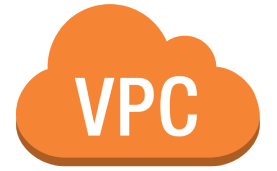A virtual private cloud (VPC) is a secure, isolated private cloud hosted within a public cloud. VPC customers can run code, store data, host websites, and do anything else they could do in an ordinary private cloud, but the private cloud is hosted remotely by a public cloud provider. (Not all private clouds are hosted in this fashion.) VPCs combine the scalability and convenience of public cloud computing with the data isolation of private cloud computing.
Imagine a public cloud as a crowded restaurant, and a virtual private cloud as a reserved table in that crowded restaurant. Even though the restaurant is full of people, a table with a “Reserved” sign on it can only be accessed by the party who made the reservation. Similarly, a public cloud is crowded with various cloud customers accessing computing resources – but a VPC reserves some of those resources for use by only one customer.
A public cloud is shared cloud infrastructure. Multiple customers of the cloud vendor access that same infrastructure, although their data is not shared – just like every person in a restaurant orders from the same kitchen, but they get different dishes. Public cloud service providers include AWS, Google Cloud Platform, and Microsoft Azure, among others.
The technical term for multiple separate customers accessing the same cloud infrastructure is “multitenancy”?
A private cloud, however, is single-tenant. A private cloud is a cloud service that is exclusively offered to one organization. A virtual private cloud (VPC) is a private cloud within a public cloud; no one else shares the VPC with the VPC customer.
A VPC isolates computing resources from the other computing resources available in the public cloud. The key technologies for isolating a VPC from the rest of the public cloud are:
Subnets: A subnet is a range of IP addresses within a network that are reserved so that they’re not available to everyone within the network, essentially dividing part of the network for private use. In a VPC these are private IP addresses that are not accessible via the public Internet, unlike typical IP addresses, which are publicly visible.
VLAN: A LAN is a local area network, or a group of computing devices that are all connected to each other without the use of the Internet. A VLAN is a virtual LAN. Like a subnet, a VLAN is a way of partitioning a network, but the partitioning takes place at a different layer within the OSI model (layer 2 instead of layer 3).
VPN: A virtual private network (VPN) uses encryption to create a private network over the top of a public network. VPN traffic passes through publicly shared Internet infrastructure – routers, switches, etc. – but the traffic is scrambled and not visible to anyone.
A VPC will have a dedicated subnet and VLAN that are only accessible by the VPC customer. This prevents anyone else within the public cloud from accessing computing resources within the VPC – effectively placing the “Reserved” sign on the table. The VPC customer connects via VPN to their VPC, so that data passing into and out of the VPC is not visible to other public cloud users.
Some VPC providers offer additional customization with:
Scalability: Because a VPC is hosted by a public cloud provider, customers can add more computing resources on demand.
Easy hybrid cloud deployment: It’s relatively simple to connect a VPC to a public cloud or to on-premises infrastructure via the VPN. (Learn about hybrid clouds and their advantages.)
Better performance: Cloud-hosted websites and applications typically perform better than those hosted on local on-premises servers.
Better security: The public cloud providers that offer VPCs often have more resources for updating and maintaining the infrastructure, especially for small and mid-market businesses. For large enterprises or any companies that face extremely tight data security regulations, this is less of an advantage.
Information Source – https://www.cloudflare.com/en-in/learning/cloud/what-is-a-virtual-private-cloud/
